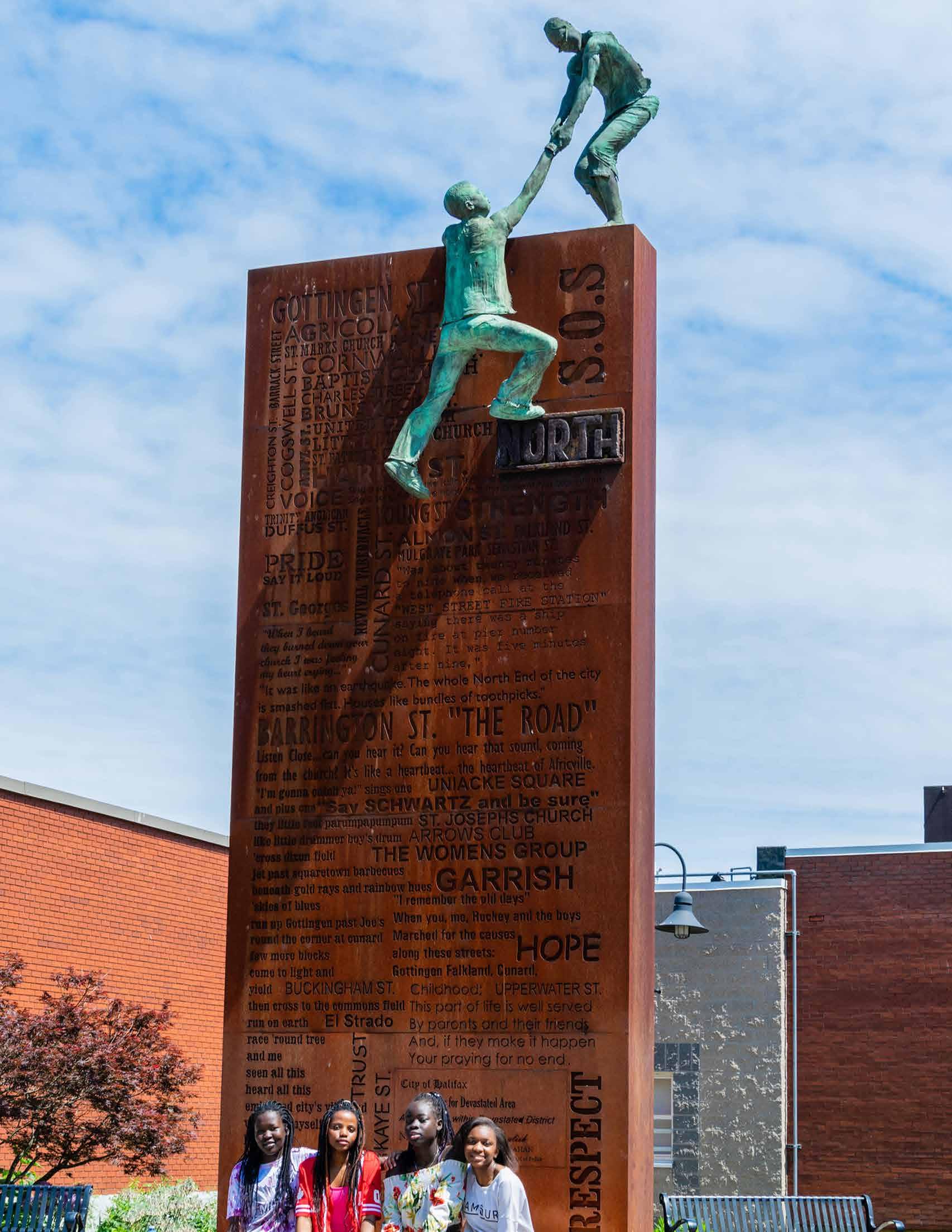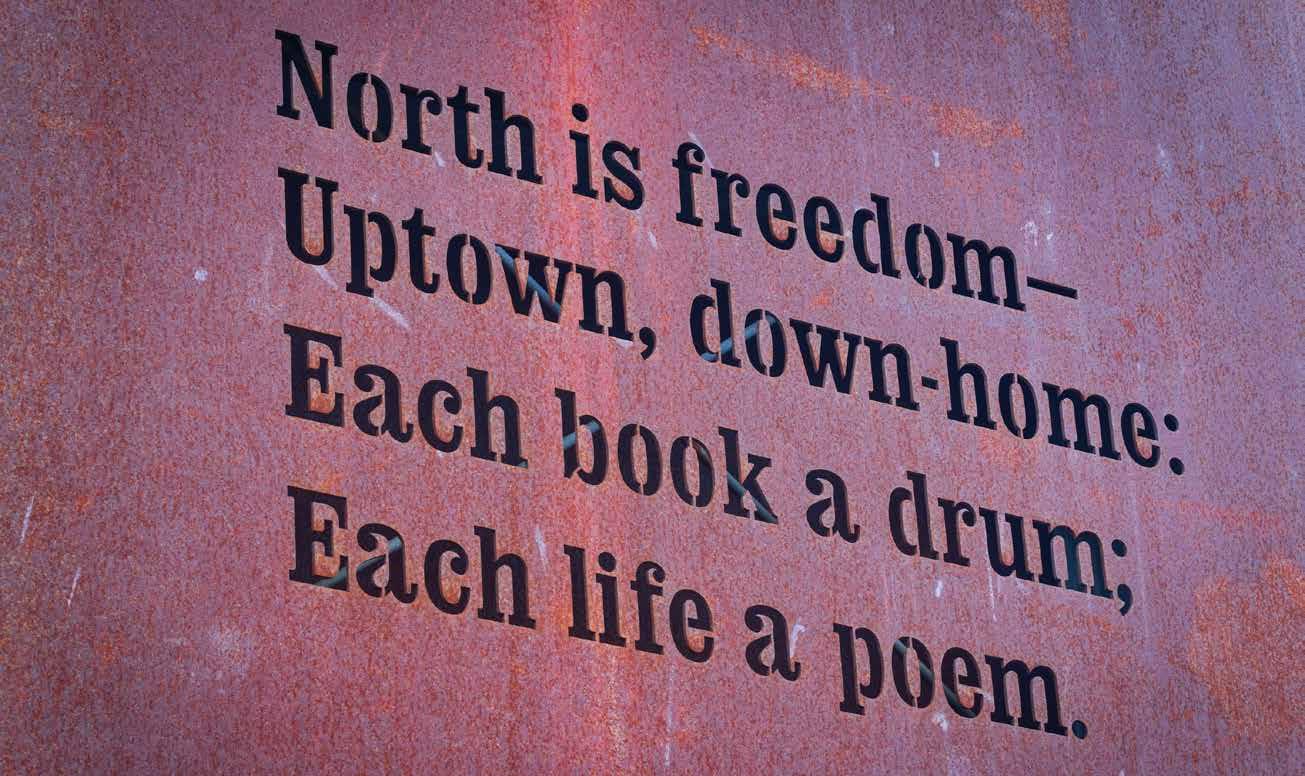
8 minute read
From Community to City Council
Micro, mezzo and macro scales of change
BY REBECCA FARIA

Lindell Smith, District 8 Councillor, Halifax
Lindell Smith has been creating change in North End Halifax for years.
Nearly every bio written about Smith has the same three facts at its core: he’s the second Black councillor elected in the Halifax Regional Municipality since amalgamation, he’s from Halifax’s North End community, and he’s the father of a young daughter. When asked about her, he answers with pride and gratitude: “I’m very fortunate to have a supportive partner in my daughter,” he says. “She’s my partner in crime. She knows that.” While his role in government is more public than his earlier community work and his former job at the Halifax North Memorial Public Library,, Smith says she’s adapted and thrived. “She’s grown into the role of supporter as much as I have.”
MICRO
When he started organizing, Smith was little older than his daughter is now. “I wanted to be involved with changing the community,” he says. “There were many mentors who were around the community, a lot of prominent names, but I felt that [while] growing up, I didn’t have a mentor.” Smith describes a feeling of imbalance: these mentor figures would be present, and would intervene with kids they saw as in need of guidance, but he wasn’t always sure he could reach back to them for support or advice. So he started to get involved with developing peer support within his community.
“I didn’t know at the time that was what we were doing,” says Smith. “But it just felt right, that someone my age should also be trying to support someone my age. It really came down to wanting to have peer-to-peer support, and knowing that we do, as young people, have the knowledge and know-how to help each other.”

The library in North End Halifax is a vital gathering place for the community. The sculpture outside its doors features Gottingen Street oral history engraved as poetry, recipes, and memories, watched over by rooftop figures cast from local youth.
Halifax Public Libraries
MEZZO
Smith later took that peer support lens with him into Centreline Studios, a nonprofit recording studio that he cofounded in Uniacke Square alongside Sobaz Benjamin and El Jones. “I realized there wasn’t a space where you could come not only to hang out, but to [share] that organized support which came in the form of music,” says Smith. “You’d have one person who’s going to record, but their friends would be sitting at the table writing while they’re listening to the beat. Or you’ll have the girls who are making a dance to the song that one of the young guys are doing. Or you have the girls who are rapping and then they’d have one of the young guys say, ‘Oh wow that was good, I want to get on that track now, too.’ When you put people in spaces where they can support each other, what comes out of it is amazing. That’s kind of how Centreline kept going, because peer to peer support made people want to come back.”
Now a city councillor, Smith stays involved with initiatives like the One North End (O.N.E.) Community Economic Development Society, which has origins very different from that of Centreline, but enacts similar values through community building and shared support. “I see that continuing as long as the community is accepting of it, and that’s the one important piece of any kind of work,” says Smith. “Hopefully they’re going to be a long standing organization that’s doing good work.”
As he speaks, it becomes clear that Smith is uncomfortable with organizations imposing themselves — without consent and cooperation — on the communities they serve. “I think as nonprofits and service providers, you have to always say to yourself: are we still in a place where we’re not only needed but accepted? Because some people will use a service – because they need it – but don’t enjoy it because of all the things around it. So as service spreads, we’re always going to be thinking: are we doing what’s necessary to make ourselves welcome, and beneficial?”
MACRO
Smith has long been vocal about the need for a social policy lens in city government, to create a framework for the kind of systemic change he envisions. Thanks in part to his efforts, the municipal government has begun to define its role in strengthening community health and well-being, equity, and inclusion.
“For me, it really comes down to the impact on people,” says Smith. “I hope that it creates that lens of thinking of the big picture, even if it takes longer. But also, really challenging us as government to do more soul searching in how we approach anything. It can be from how we approach paving all the way to how we open a community centre. “
When asked what he hopes to carry forward when he leaves elected office, Smith answers, “I want to say, all of it.” He thinks on it for a moment, and then elaborates: “Being an elected official is its own animal in itself, in everything. I don’t even know how to explain it to someone else. What I will say is my decision-making skills have definitely been affected in a good way, because now I have to think not only for my people I represent my district, but also I have to think about a city. And that makes me think about the broader picture.”
Smith continues: “I identify as African Nova Scotian. And young – well not that young anymore – Black male from the community, and also my family’s from Preston,” he says. “Even though I say that a politician is my role and it’s not who I am, it is part of my life and I’ll forever be known as that. That’s part of this role and how people see you. But I can’t help but use my lens of young Black male who grew up in the community, so that unconsciously gives me a lens that many people around the table don’t have. It also informs me differently. Most times when I make a decision it’s coming from that place, of this is who I am, and I can’t think of any other way.”
Smith identifies the Black Lives Matter Movement as a clear continuation of prior racial justice work. “A lot of what is being said today is what has been communicated for decades. You can go back to the Rocky Jones era,” says Smith. “A lot of what’s being said is being said differently, by younger voices obviously, but it’s not new.”
“We’ve missed the mark on making that change, but what we’re seeing with what’s currently going on with the climate, and all of the incidents that have happened more recently, and now the heightened experiences that come with COVID, people are feeling that there’s now this spotlight where we can’t be stagnant.” He mentions American cities dismantling their police forces and starting over, Toronto’s plans for police body cameras, and his own efforts for police reform and accountability in Halifax. “I continue to think of the folks who’ve been doing the work,” says Smith. “I think we’re slowly getting on track, but not at the pace that we need to make the systemic change. Government is a creature of doing things at a sloth’s pace, and is very afraid of jumping forward without making sure all the things are in place. Sometimes it’s good, sometimes that’s bad. But for what we’re speaking of today, we can think of how to move faster.”
“North American government hasn’t really represented all of the folks that they’re supposed to represent,” says Smith. “I hope for us that we get to a place where we have more than one person who’s of African descent. That we have somebody who’s two generations from wherever Canadian, whether it’s Lebanese or Asian descent. Having somebody who’s Mi’kmaw or Indigenous at our table. More women. Younger people. We can’t have it all with only 16 of us, but I feel that we can get there. And this next election could change that, because there are a few folks who are running who would change that dynamic and look pretty good to win, hopefully. At the same time, there’s still not a lot of people of colour who are running. And it really takes those who have experience in the role to support them. That’s part of what I want to do next time around if I get in, is create that support system that’s needed so folks can get organized early and know what they’re getting into.”
Smith’s drive to have more kids – like his younger self, like his daughter – realize their own agency is undeniable. “That’s why I still go to schools and talk about my role and do mock elections and all that stuff,” he says. “I think it’s so important at that young age that kids understand how their cities and democracies work, because one day they’re going to be paying taxes, making decisions. And, who knows, being elected.”

North Is Freedom, the sculpture outside the North Branch, is named after a poem by George Elliott Clarke - his words have been also been engraved on the corten steel.
Halifax Public Libraries
REBECCA FARIA has lived in three provinces and two territories, and her first paycheque was earned by teaching tourists how to pan for gold next to the Yukon river. She has made Halifax her home since 2005, and is currently the communication coordinator at the Nova Scotia College of Social Workers.







